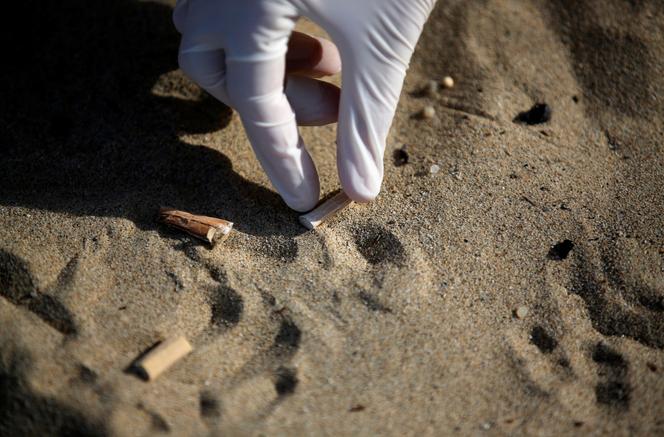


"The sea starts here." In the towns surrounding Arcachon Bay in southwestern France, stainless steel signs adorn the sidewalks that hang over storm drains serving as a reminder that everything thrown into the gutters ends up in the bay. Cigarettes are no exception. A social media campaign launched in July by the local association of the bay's 12 communes, still scarred by the violent forest fires of summer 2022, implores the public: "Don't litter with your cigarette butts anymore!" Summer after summer, there have been repeated efforts to raise awareness: In 2019, the town hall in Arcachon decreed a "cigarette butt-free beach" and installed 113 garbage cans on the beach; two years later, the town hall in Lège-Cap-Ferret distributed pocket ashtrays in the colors of the peninsula. Unfortunately, the beach is still a giant ashtray.
In every clean-up operation organized on coasts around the world, cigarette butts are the most frequently found form of waste. Whether on the beach or in the streets, an estimated 4.5 trillion cigarette butts are thrown on the ground every year worldwide, invariably ending up in rivers and oceans. In France, 23.5 billion cigarette butts are thrown into public spaces every year, according to the French Ministry of Environmental Transition. In Paris, around 350 tonnes are collected every year. This pollution costs local authorities an estimated €100 million a year, but its environmental consequences remain largely unknown.
Only one in four French citizens knows that cigarette filters are made of plastic (cellulose acetate) and not, as one in two French citizens believes, made of wadding (cotton), according to a survey carried out in 2022 by the BVA Institute for the ACT-Alliance Against Tobacco organization, which involves some 20 organizations including the National League Against Cancer. One out of five smokers even thinks that cigarettes, whether conventional or electronic, are biodegradable. "It can take a cigarette butt 12 years to degrade" warns a sign on Arcachon's busy pier. In reality, it takes much longer: When coming into contact with water, the filter degrades into micro and nanoplastics. A cigarette butt can contaminate up to 500 liters of water, according to the French Ministry of Environmental Transition. And not just in plastic particles. It also releases thousands of toxic chemical substances into the environment: mainly nicotine but also heavy metals (arsenic, mercury, lead) and ammonia.
Due to their high toxicity, the National Institute for the Industrial Environment and Risks (INERIS) considers butts to be "ecotoxic" and classifies them as hazardous waste. They're a danger for terrestrial ecosystems: A 2017 report by INERIS highlighted a significant excess in the mortality of earthworms and an inhibition of plant growth linked to the presence of cigarette butts in the soil). And marine ecosystems: A single cigarette butt can decimate half a population of fish swimming in 1 liter of water, according to a 2011 study by the University of San Diego.
You have 64.36% of this article left to read. The rest is for subscribers only.
